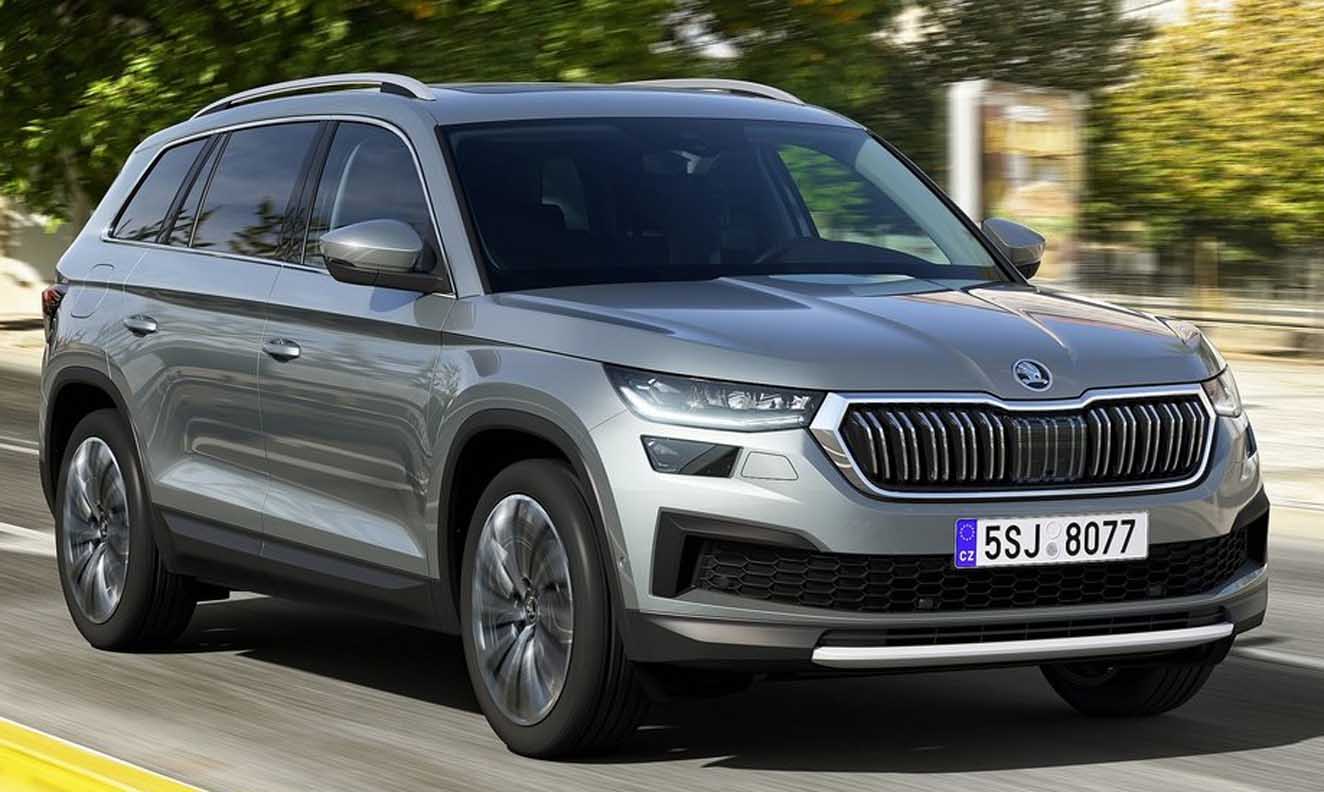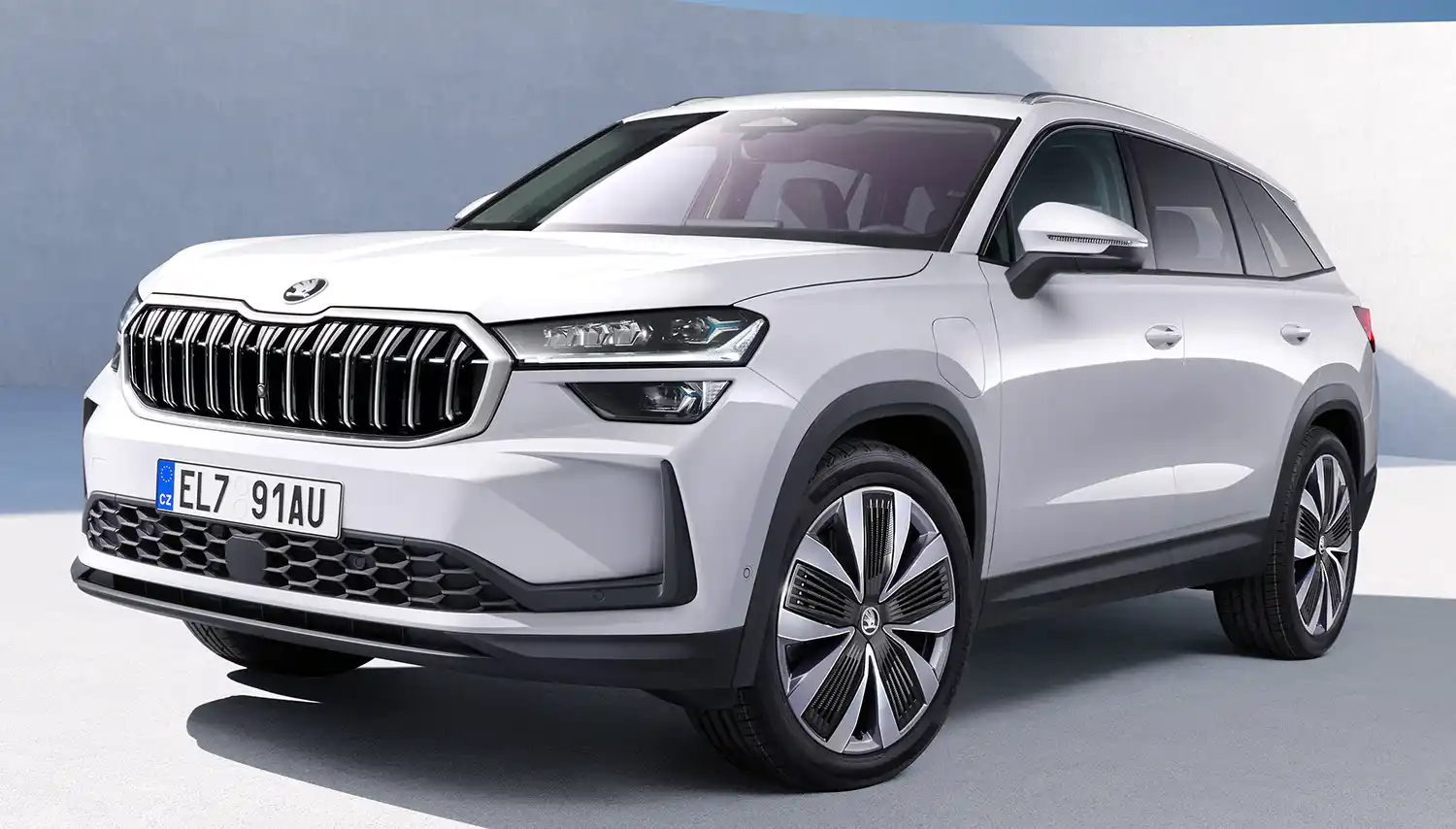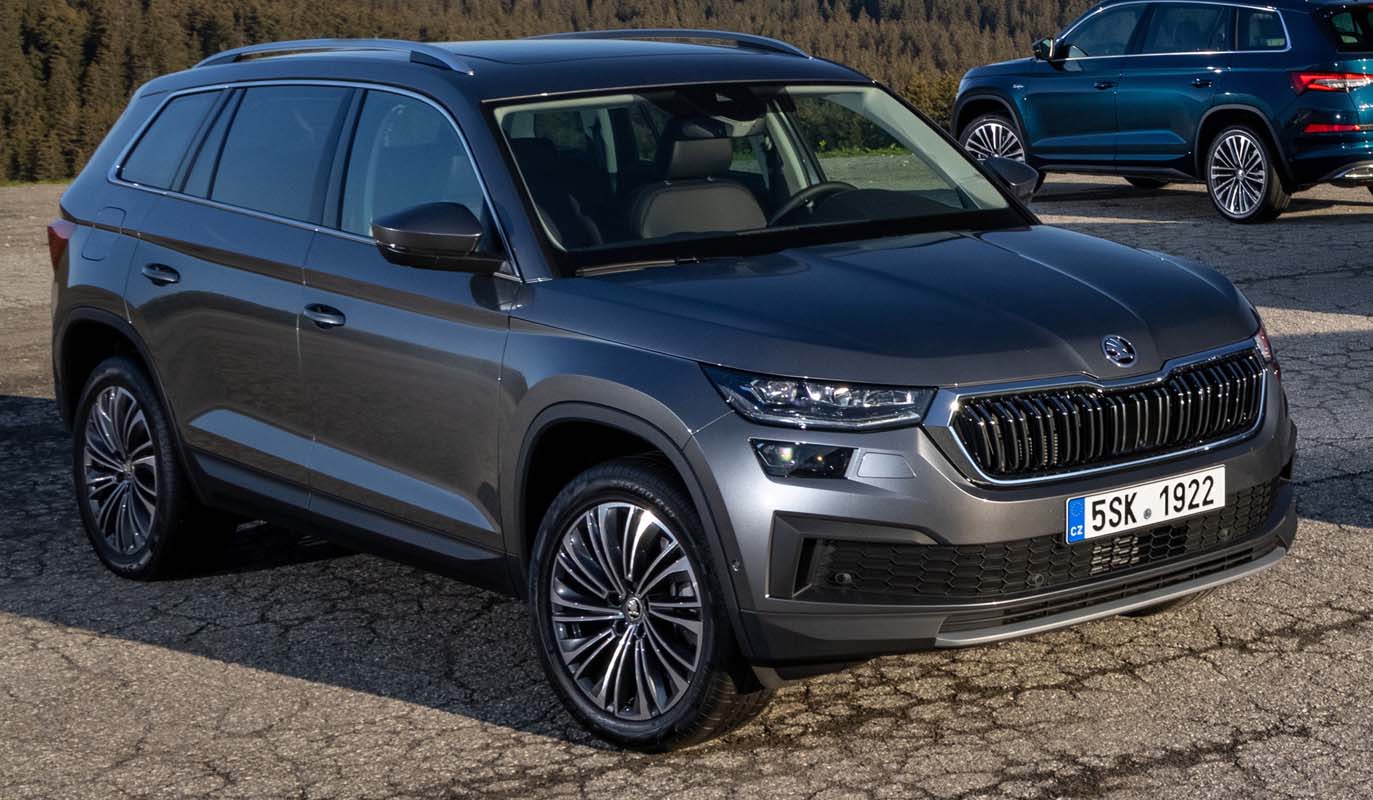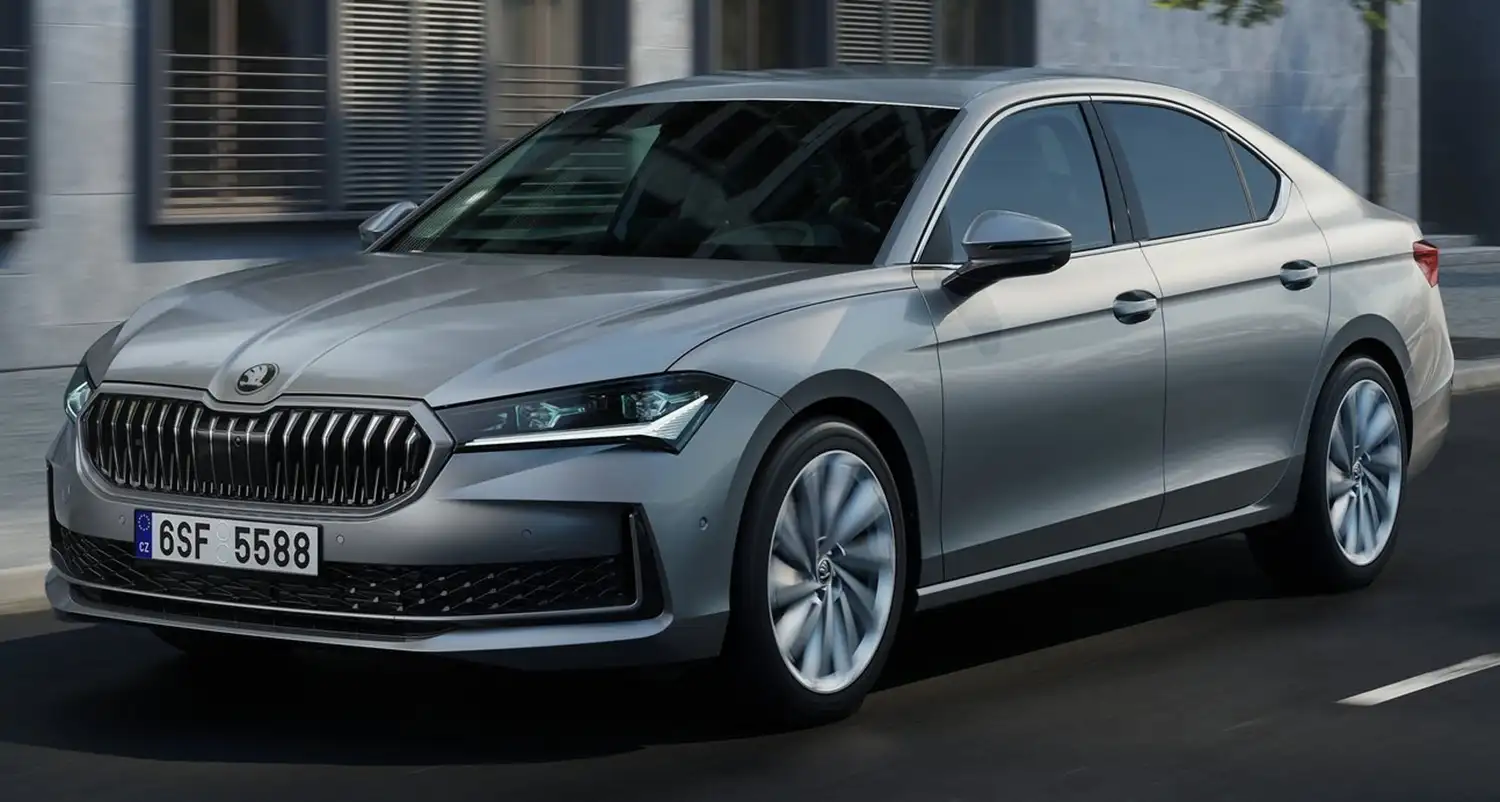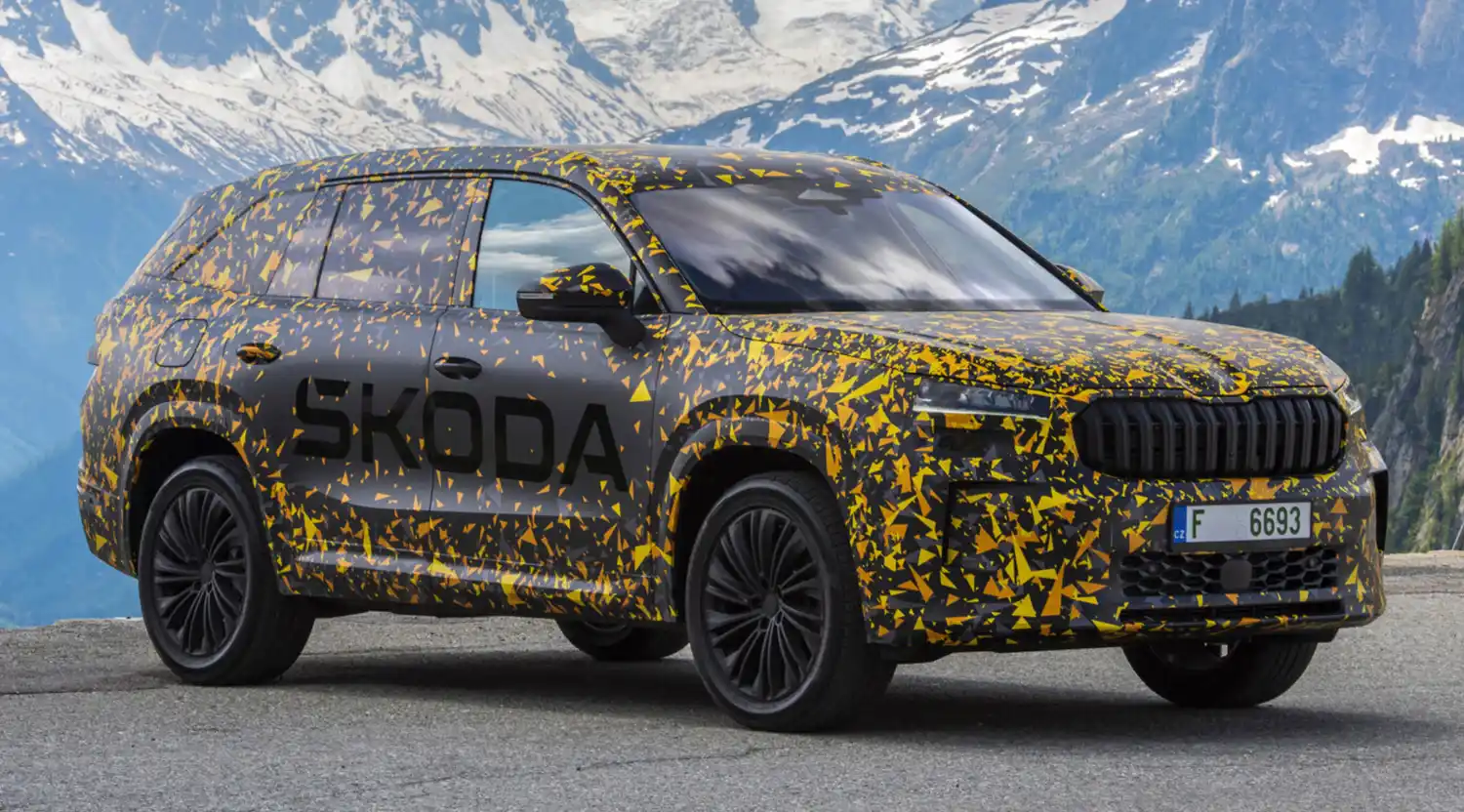
With the second generation of the Kodiaq, Škoda has further improved its globally successful large SUV. It now comes with a more distinctive design and even more space, especially for passengers in the third seat row. In addition, the second generation of the Kodiaq is marked by a new interior concept featuring a touchscreen display measuring up to 12.9 inches, a gearshift lever on the steering column, manual and digital controls and a tidy, well-organised centre console. The engine roster includes two petrol and two diesel engines ranging from 110 kW (150 hp) to 150 kW (204 hp) as well as a plug-in hybrid version – a first for the Kodiaq. This offers an electric range of more than 100 kilometres. The safety equipment is once again state-ofthe-art, boasting for example second-generation full LED Matrix headlights and even more advanced assistance systems. Also on board: new Simply Clever features, such as a rear storage compartment with a cup holder and a dual Phone Box that provides cooling and simultaneous charging for two mobile phones.
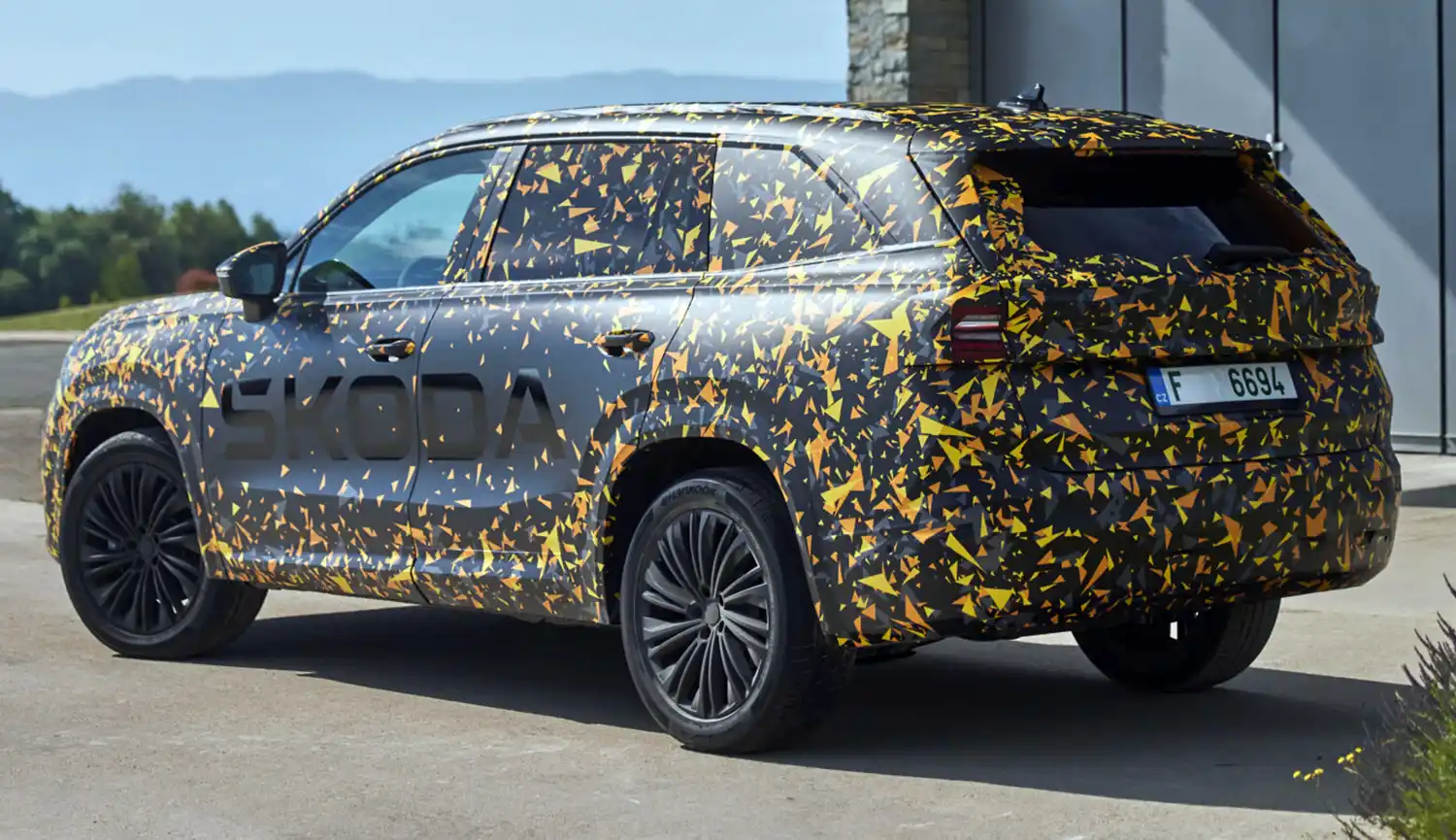
Klaus Zellmer, Chairman of the Board of Škoda Auto, says: “The Kodiaq has been an absolute success for Škoda ever since its launch in 2016, when it kickstarted our SUV campaign. With its powerful and crystalline design language, spacious interior and excellent value for money, it attracted many new customers and won renowned international awards. The second generation has all the prerequisites – including a plug-in hybrid version – to add another great chapter to this success story.”

Johannes Neft, Škoda Auto Board Member for Technical Development, says: “Improving a vehicle as popular as the Kodiaq is always a challenge. Nevertheless, we further sharpened the look while keeping the distinctive elements of our SUV design language. In addition, the new Kodiaq offers even more interior space and will take safety, technology and versatility to the next level. With the plug-in hybrid version, we are also adding a new powertrain offering more than 100 kilometres of electric range to the portfolio.”
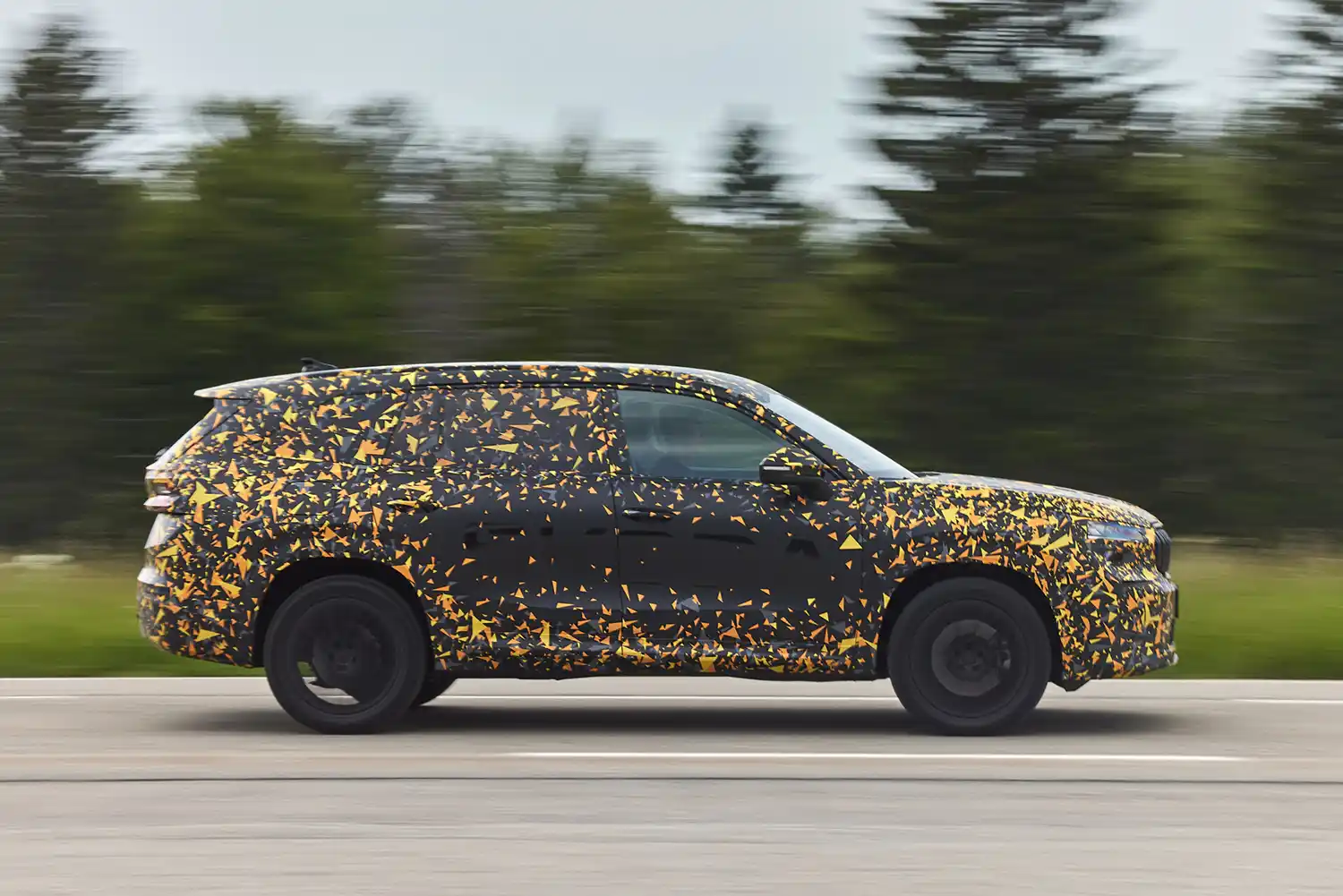
More power, new technologies and greater sustainability
The second-generation Kodiaq is characterised by an even more sophisticated design, the use of sustainable materials and innovative technologies such as second-generation full LED Matrix headlights. Its two petrol and two diesel engines range from 110 kW (150 hp) to 150 kW (204 hp). The 2.0 TDI with 142 kW (193 hp) and the 2.0 TSI with 150 kW (204 hp) come with all-wheel drive as standard. The Kodiaq iV, the first plug-in hybrid in this model series, also offers a total power output of 150 kW (204 hp). It has an electric range of more than 100 kilometres. The highlight is the entry-level 1.5 TSI petrol engine with 110 kW (150 hp), which marks the debut of mild-hybrid technology in the Kodiaq. Both hybrid engines are part of the latest generation of EA 211 evo2 engines. They run on the fuel-efficient Miller cycle and feature a turbocharger with variable turbine geometry. The 1.5 TSI with mild-hybrid technology also comes with latest-generation active cylinder technology (ACT+).
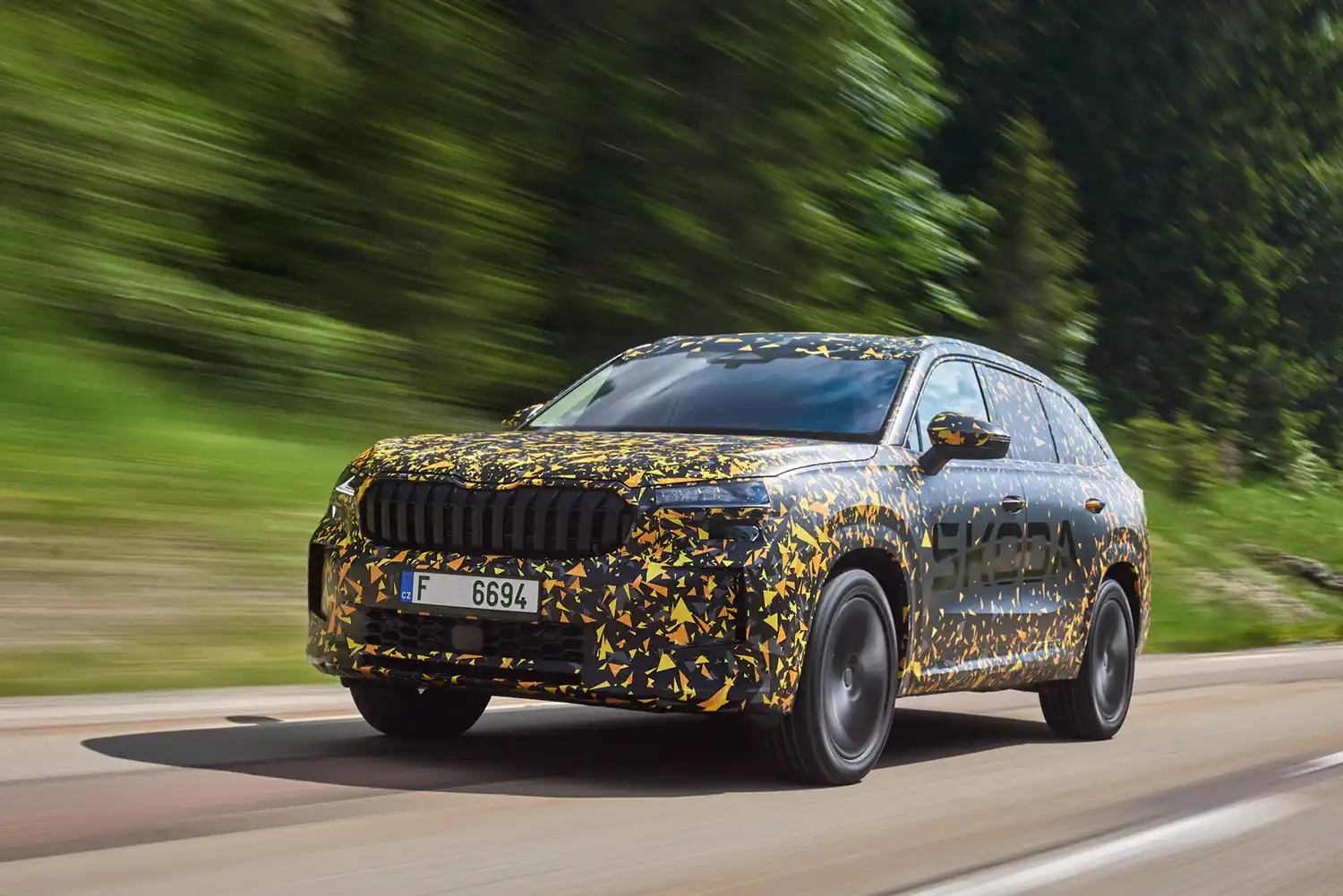
The Kodiaq – the model that kickstarted Škoda’s SUV campaign
As the first model in Škoda’s successful SUV campaign, the Kodiaq brought the brand’s crystalline design language to the SUV category in 2016. At the same time, it established the typical nomenclature that all subsequent Škoda SUVs with internal combustion engines followed: their name starts with a “K” and ends with a “q”. A superb amount of space for up to seven passengers and advanced technology quickly made the Kodiaq one of the most successful models in Škoda’s global portfolio. It has sold almost 792,000 units in a total of 60 countries to date. In 2018, the Kodiaq RS was the first SUV to join the brand’s sporty RS family. The most important markets for Škoda’s large SUV are China with 160,000 units sold by the end of 2022 and Germany with 114,200 units. Next come the UK and the Czech Republic at 47,200 and 42,400 units respectively. It has therefore contributed greatly to Škoda’s successful development on the international markets and has received excellent feedback from customers as well as from experts and the motoring press: to date, the model has collected more than 40 international awards. In November 2016, British car magazine TopGear named it the world’s “Best Car for Big Families”. This was followed by
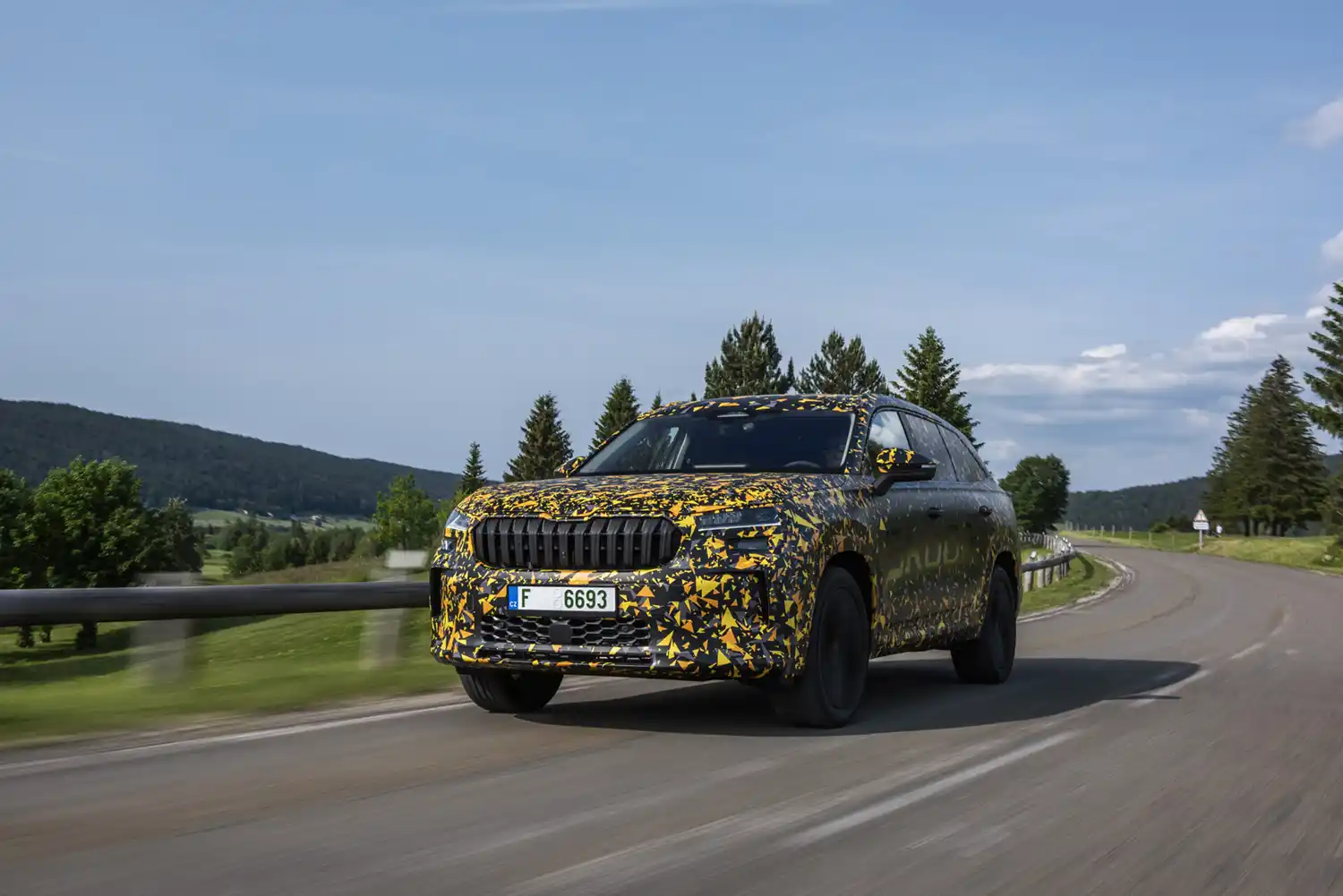
“Car of the Year” awards in the Czech Republic, Poland and Bulgaria, as well as several “SUV of the Year” awards in various categories from British, Chinese, French and Indian media. In total, the Kodiaq won Auto Bild Allrad’s “All-Wheel Drive Car of the Year” title four times in its biggest European market, Germany. The German Auto Test magazine also awarded it the title of “Best Tested Import Vehicle” in 2017. In addition, it won the renowned Red Dot Award for outstanding product design in 2017.
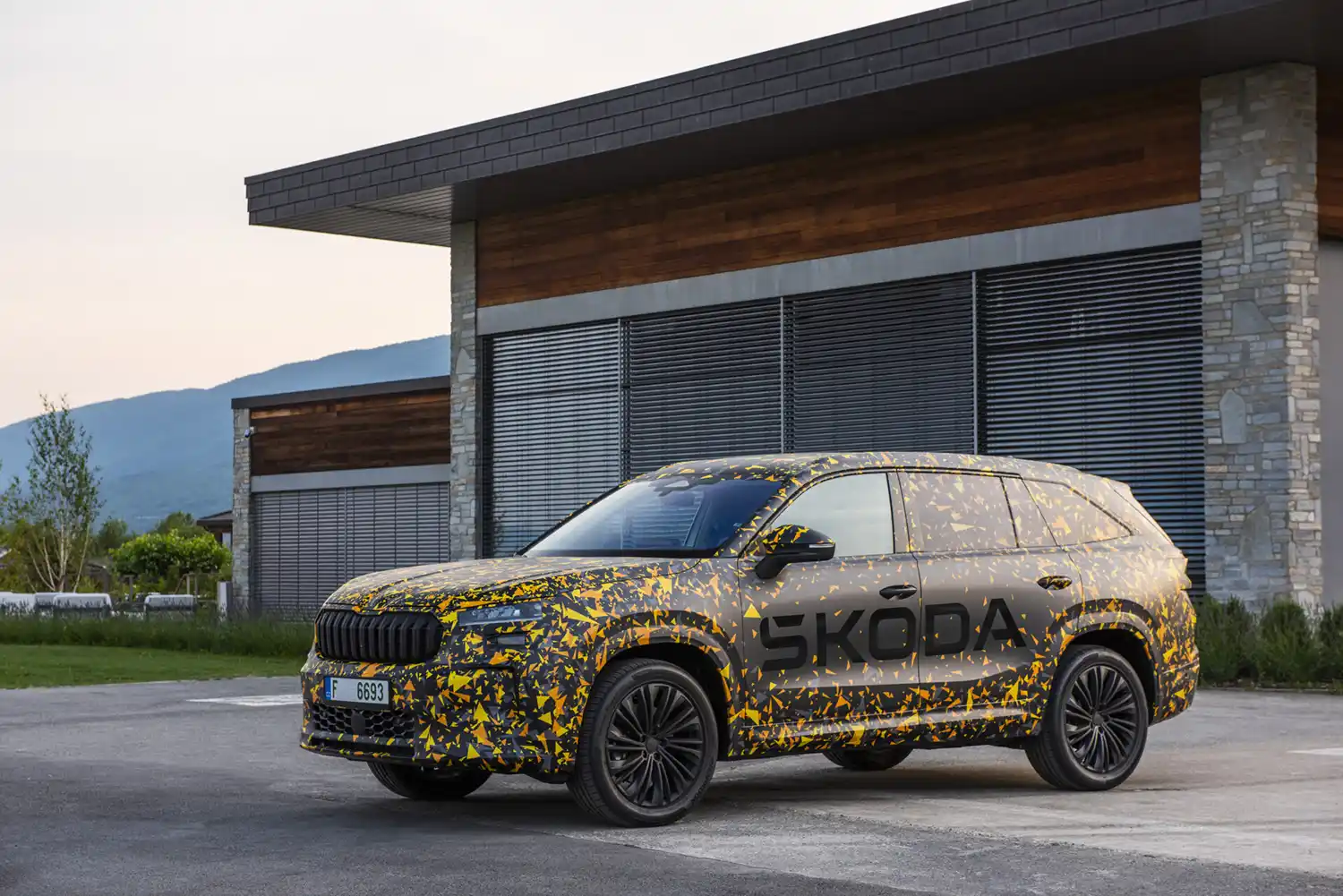
New Simply Clever features – it’s the Kodiaq way
The first generation of the Kodiaq already featured many of Škoda’s Simply Clever ideas. In 2016, for example, it introduced door edge protection and an electric child safety lock for the rear doors. The second generation now boasts a bevy of new features: a new cooled dual Phone Box allows two mobile phones to be charged at the same time with an increased charging power of 15 W. Making its Kodiaq debut is a rear storage compartment with a cup holder on the central tunnel as well as a display cleaner for the touchscreen displays. The umbrella and ice scraper are now made of sustainable materials.
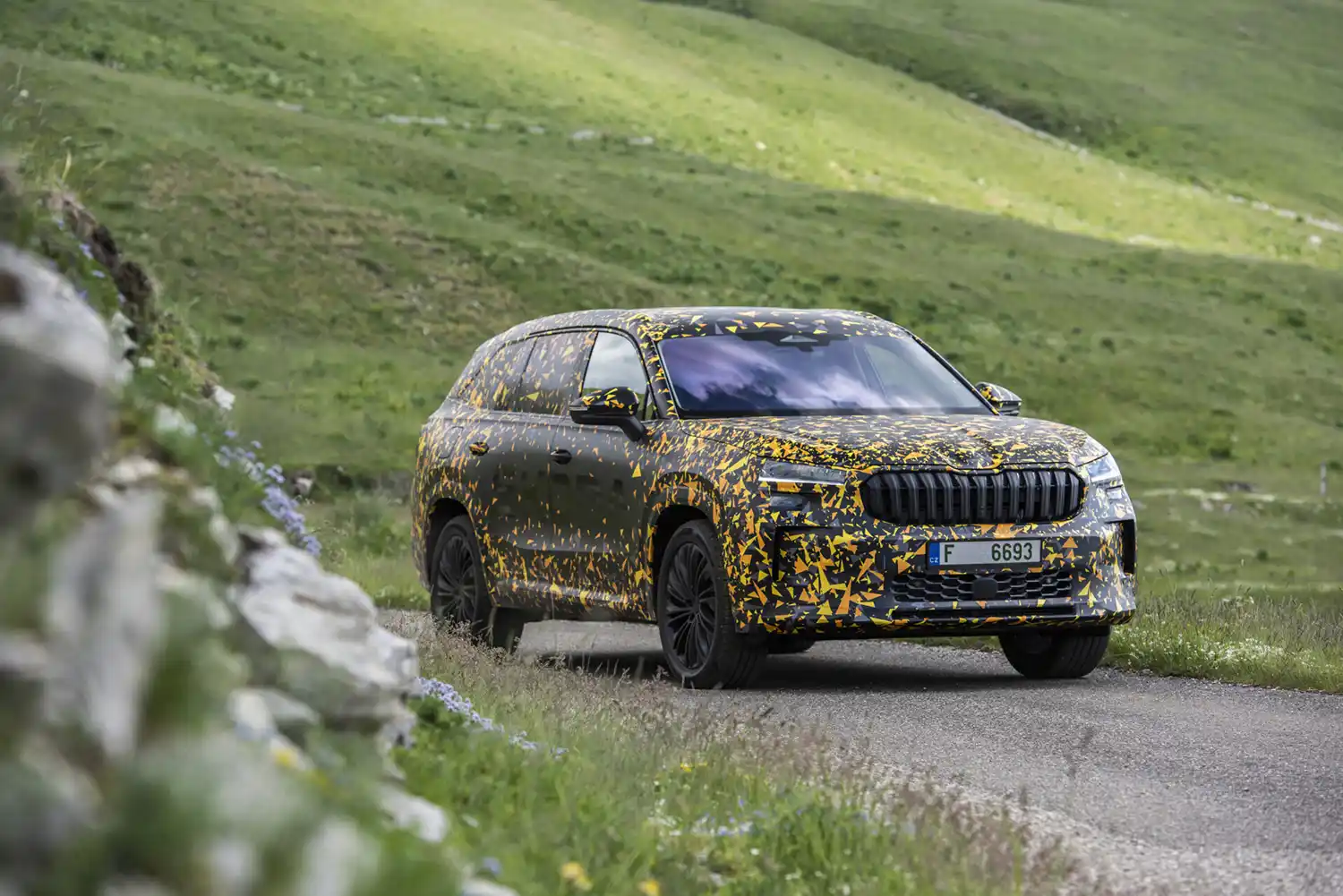
Škoda has refined the powerful and emotional design of its Kodiaq SUV. With a 61-millimetre increase in length and a further increase in wheelbase, the second generation offers even more space for up to seven occupants and additional headroom in the optional third seat row. Exterior highlights include the sculptural front end, squared-off wheel arches and second-generation full LED Matrix headlights. The completely redesigned interior is defined by the 12.9-inch central display, a tidy, well-organised centre console and a combination of manual and digital controls for intuitive operation.
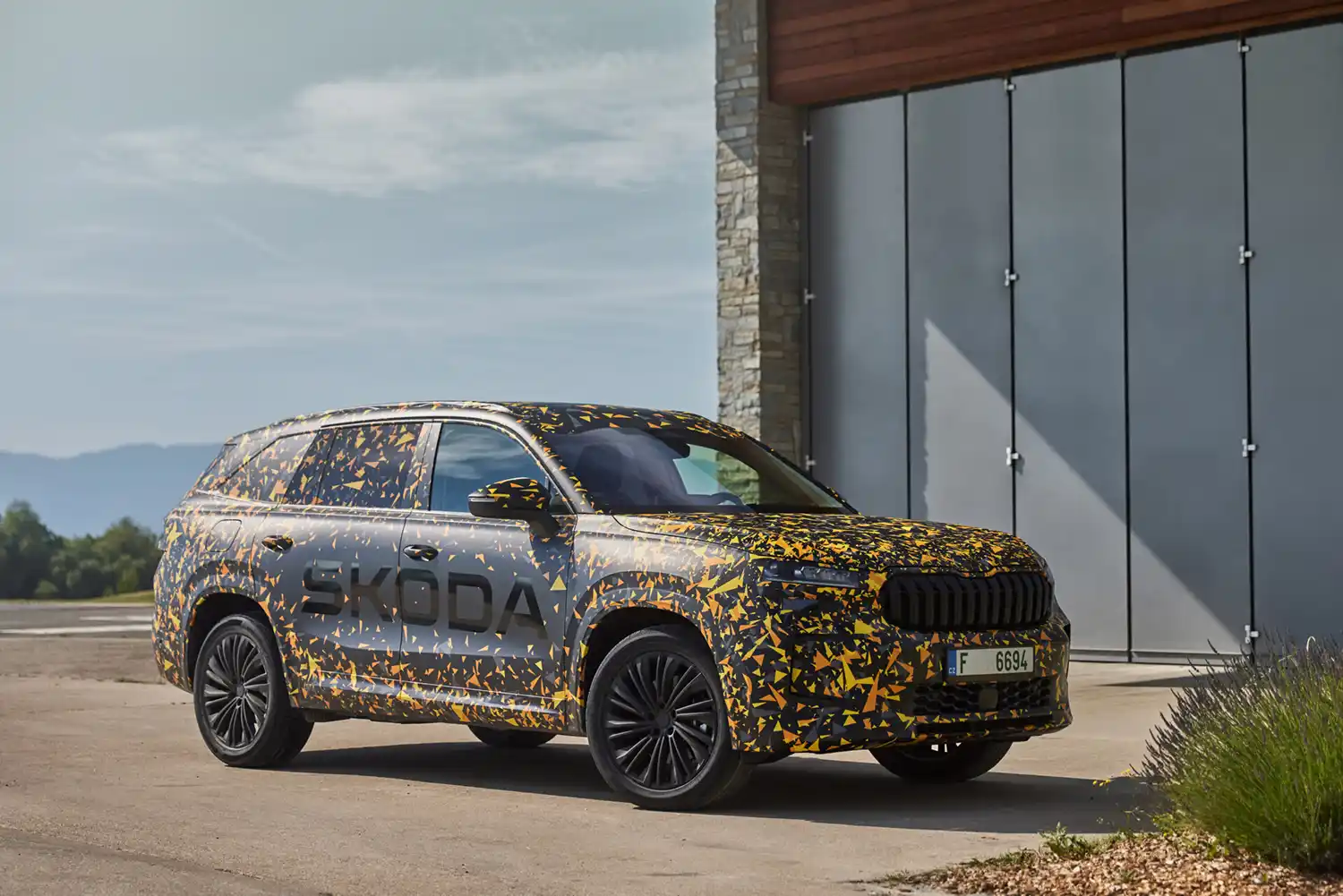
Oliver Stefani, Head of Škoda Design, says: “The new Kodiaq looks even more distinctive, dynamic and powerful than its predecessor. We have taken the essence of our characteristic Škoda SUV design language to the next level and sharpened it even further. On top of that we have implemented a new interior concept featuring a clever combination of manual and digital controls for an even more intuitive and comfortable driving experience.”
Powerful appearance and second-generation full LED Matrix headlights
A sculptural front end, squared-off wheel arches and large wheels measuring 17 to 20 inches in diameter emphasise the powerful appearance of the second Kodiaq generation.
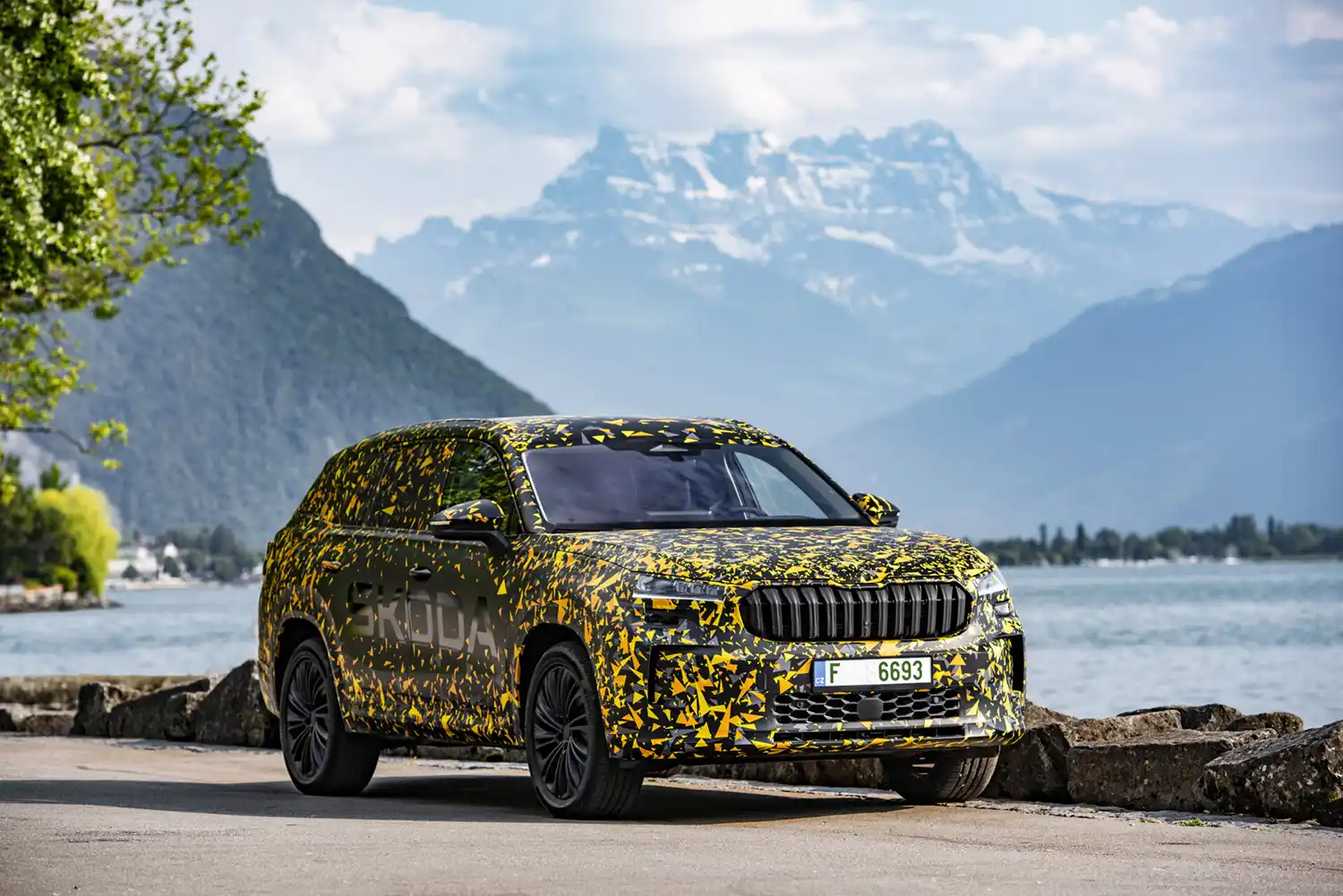
At 4,758 millimetres in length, the new Kodiaq surpasses its predecessor by 61 millimetres. In the seven-seat version, passengers in the third seat row now have 15 millimetres more headroom, at 920 millimetres. Luggage capacity remains generous – 340 to 845 litres for the seven-seater and 910 litres for the five-seater. The new Kodiaq features sculpted full LED
Matrix headlights, enhanced with the addition of a coloured crystalline element called Crystallinium. Reminiscent of coloured crystal glass, this accentuates the headlights’ contours, adding a touch of elegance and extra visual appeal.

Completely redesigned interior and new Simply Clever features
The second-generation Kodiaq comes with a completely redesigned interior. The gearshift lever is now located on the steering column, a Škoda first. This makes for a particularly neat and uncluttered centre console. The new central touchscreen display measures 12.9 inches. Furthermore, customers can now order a head-up display to complement the 10,25-inch Virtual Cockpit. The second-generation Kodiaq is marked by a clever combination of manual and digital controls. Making its debut in the Kodiaq is a rear storage compartment on the central tunnel with a cup holder for the rear passengers. There is also a display cleaner for the touchscreen displays. The second seat row can be moved, and a flexible element in the luggage compartment keeps things tidy. In addition, the large SUV comes with familiar features like door edge protectors and the iconic umbrella in the driver’s door.
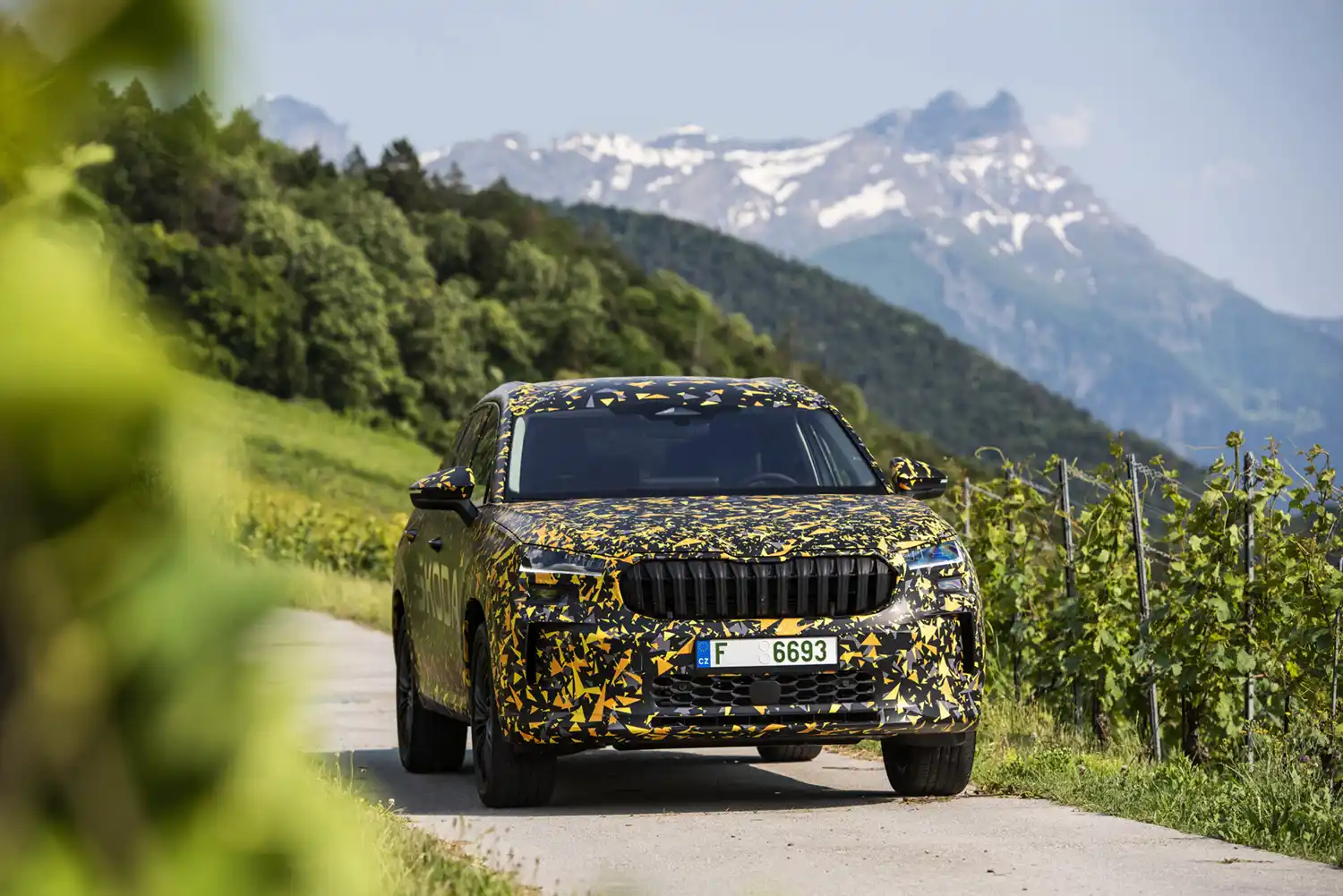
Dimensions* (compared to the current model)
| Dimensions | |
| Length [mm] | 4,758 (+61) |
| Width [mm] | 1,864 |
| Height [mm] | 1,657 |
| Wheelbase [mm] | 2,791 |
| Headroom in the third row of seats** [mm] | 920 (+15) |
| Luggage capacity [litres] | 910 (+75) |
- * Preliminary data.
- ** Applies to the seven-seater.
The second-generation Škoda Kodiaq offers an even wider range of powertrains, including a plug-in hybrid drivetrain in the new Kodiaq iV. This version delivers a system output of 150 kW (204 hp) and an all-electric range of more than 100 kilometres. In addition, two diesel and two petrol engines are available, with outputs ranging from 110 kW (150 hp) to 150 kW (204 hp). The entry-level 1.5 TSI petrol version also marks the debut of mild-hybrid technology in the Kodiaq model series. Two versions come with all-wheel drive, and all new Kodiaq models are equipped with DSG automatic transmission as standard.
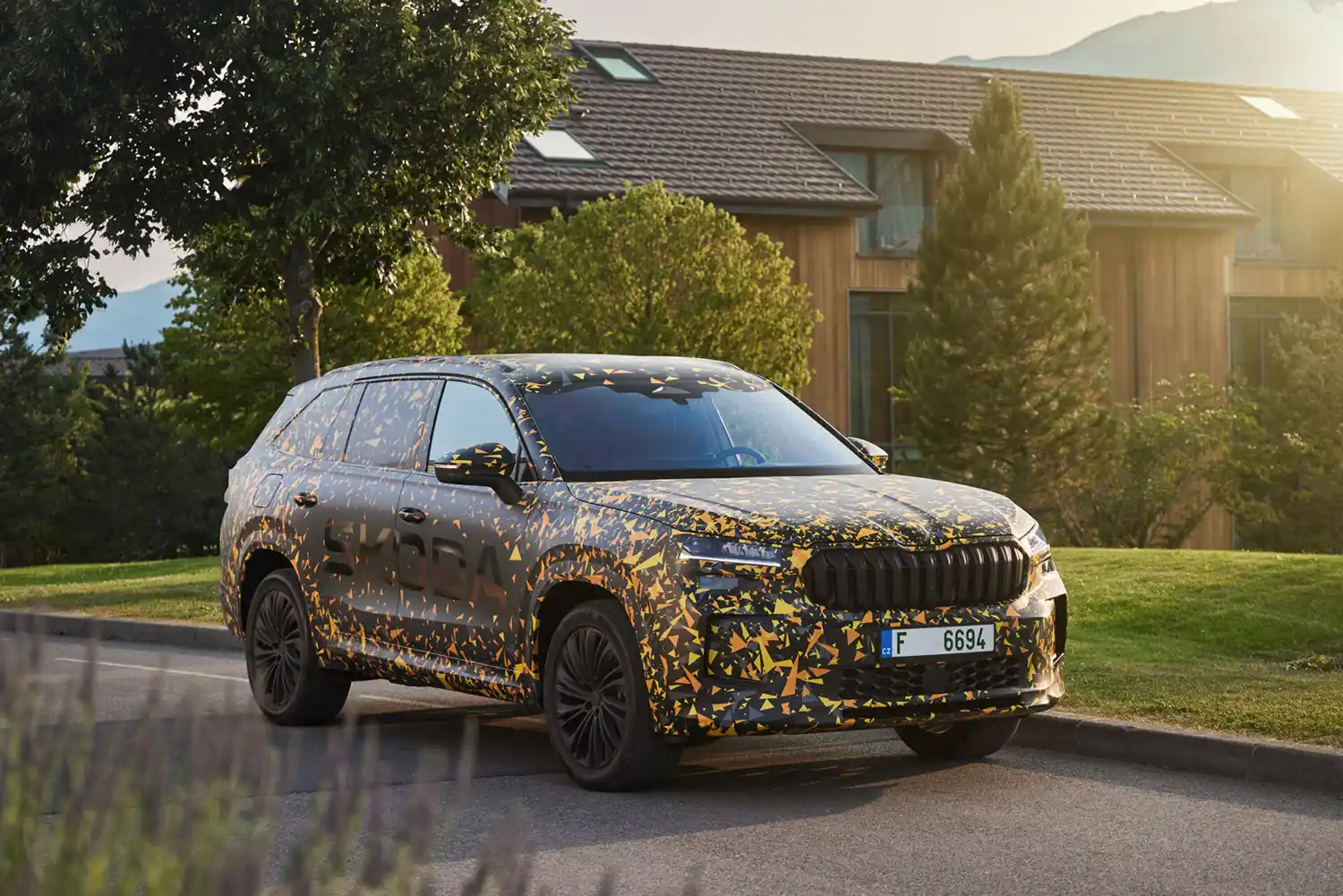
Plug-in hybrid with an all-electric range of more than 100 kilometres
The second Kodiaq generation sees Škoda offering a plug-in hybrid version of its large SUV for the first time. In the Kodiaq iV, a 110 kW (150 hp) 1.5 TSI and an electric motor join forces to develop a system output of 150 kW (204 hp), which is delivered to the front wheels via a 6-speed DSG. A 25.7 kWh high-voltage battery provides an all-electric range of more than 100 kilometres. It supports AC recharging at 11 kW from wallboxes and charging points. The battery can be replenished even faster at DC fast-charging stations, at rates of up to 50 kW.

Mild-hybrid technology for the entry level
In addition to the Kodiaq iV, Škoda offers a pair each of modern and efficient diesel and petrol engines, all of which are exclusively mated to a 7-speed DSG. The two 2.0 TDI units produce 110 kW (150 hp) and 142 kW (193 hp) respectively. The highlight is the 1.5 TSI entrylevel petrol engine with 110 kW (150 hp), which marks the debut of mild-hybrid technology in the Kodiaq. Both hybrid engines are part of the latest generation of EA 211 evo2 engines. They run on the fuel-efficient Miller cycle and feature a turbocharger with variable turbine geometry. The 1.5 TSI with mild-hybrid technology also comes with latest-generation active cylinder technology (ACT+). The more powerful 2.0 TSI petrol unit delivers 150 kW (204 hp). The 142 kW (193 hp) TDI and 150 kW (204 hp) TSI engines are equipped with all-wheel drive as standard, and all five powertrains meet the Euro 6e emissions standard.

- * Combined maximum power output (combustion engine and electric motor).
For the second model generation, Škoda has raised the safety level of the Kodiaq even higher and further improved some of its numerous assistance systems. Examples of this include the Emergency Assist and Traffic Jam Assist. Available for the first time in the Kodiaq is the new Remote Parking Assist, which will debut next year and enable remote parking using an app. In addition, there are up to nine airbags protecting the occupants, for the best possible passive safety.
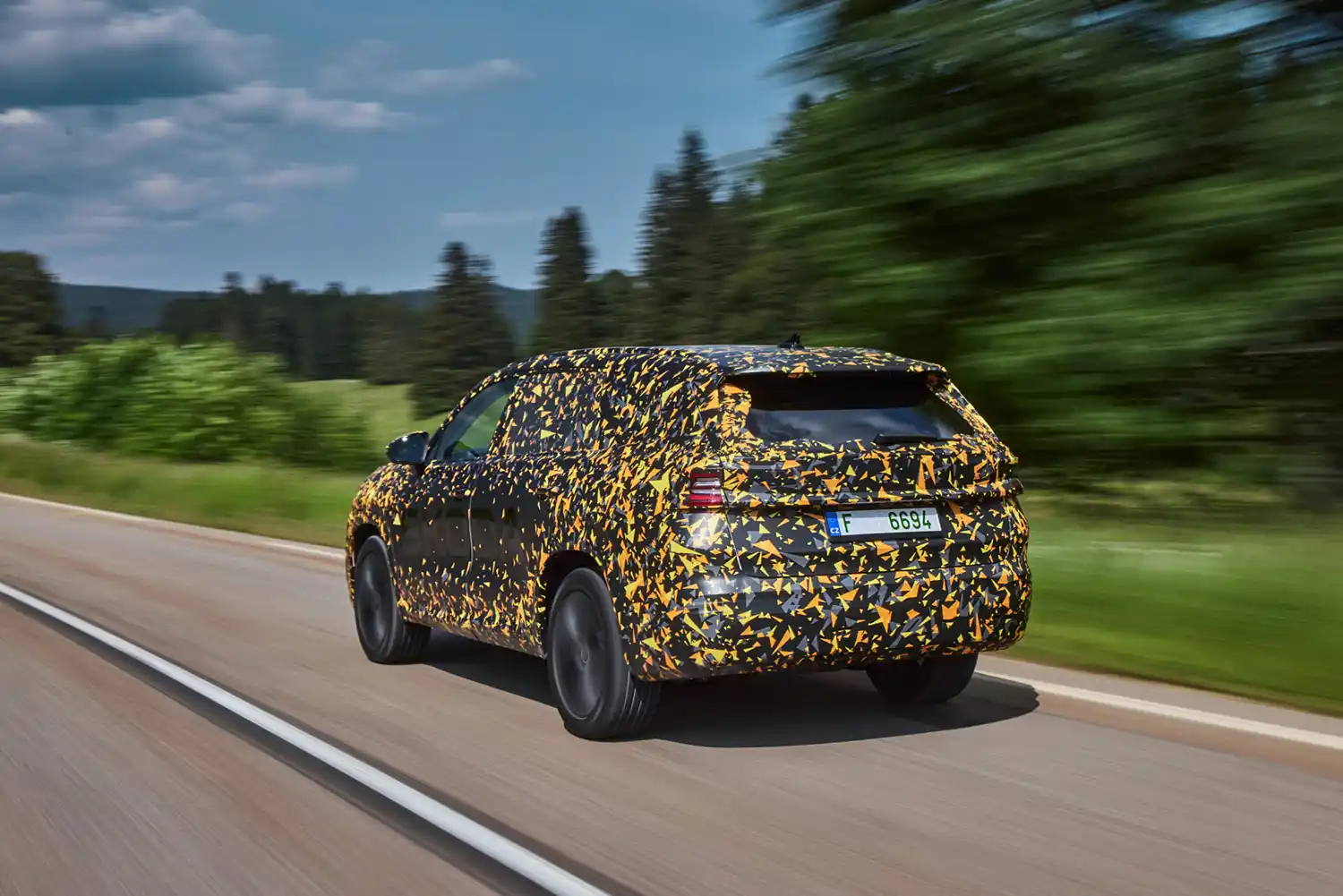
Advanced assistance systems for even more safety
The second-generation Kodiaq offers state-of-the-art active and passive safety. Up to nine airbags protect the passengers. In addition to driver and front passenger airbags, front side airbags, head airbags and a central airbag between the front seats are all included as standard. Side airbags for the rear seats are available as an option, as are the enhanced Crew Protect Assist and Emergency Assist. As soon as sensors detect emergency or panic braking or an imminent collision – this now includes impending rear-end collisions – Crew Protect Assist automatically closes windows and, where applicable, the panoramic roof; it also activates the hazard warning lights and tightens the front seat belts. Emergency Assist reduces the risk of an accident should the driver no longer be able to control the vehicle – for example, due to a medical emergency. If the system detects such a situation, it takes over lane control, switches on the hazard warning lights and applies the brakes to bring the vehicle to a gentle stop. Part of the optional Travel Assist is Traffic Jam Assist, which combines Predictive Cruise Control with the functions of the Adaptive Lane Assist. It enables automatic starting, braking and steering in congested traffic up to a speed of 60 km/h by adapting to the movements of the surrounding vehicles.
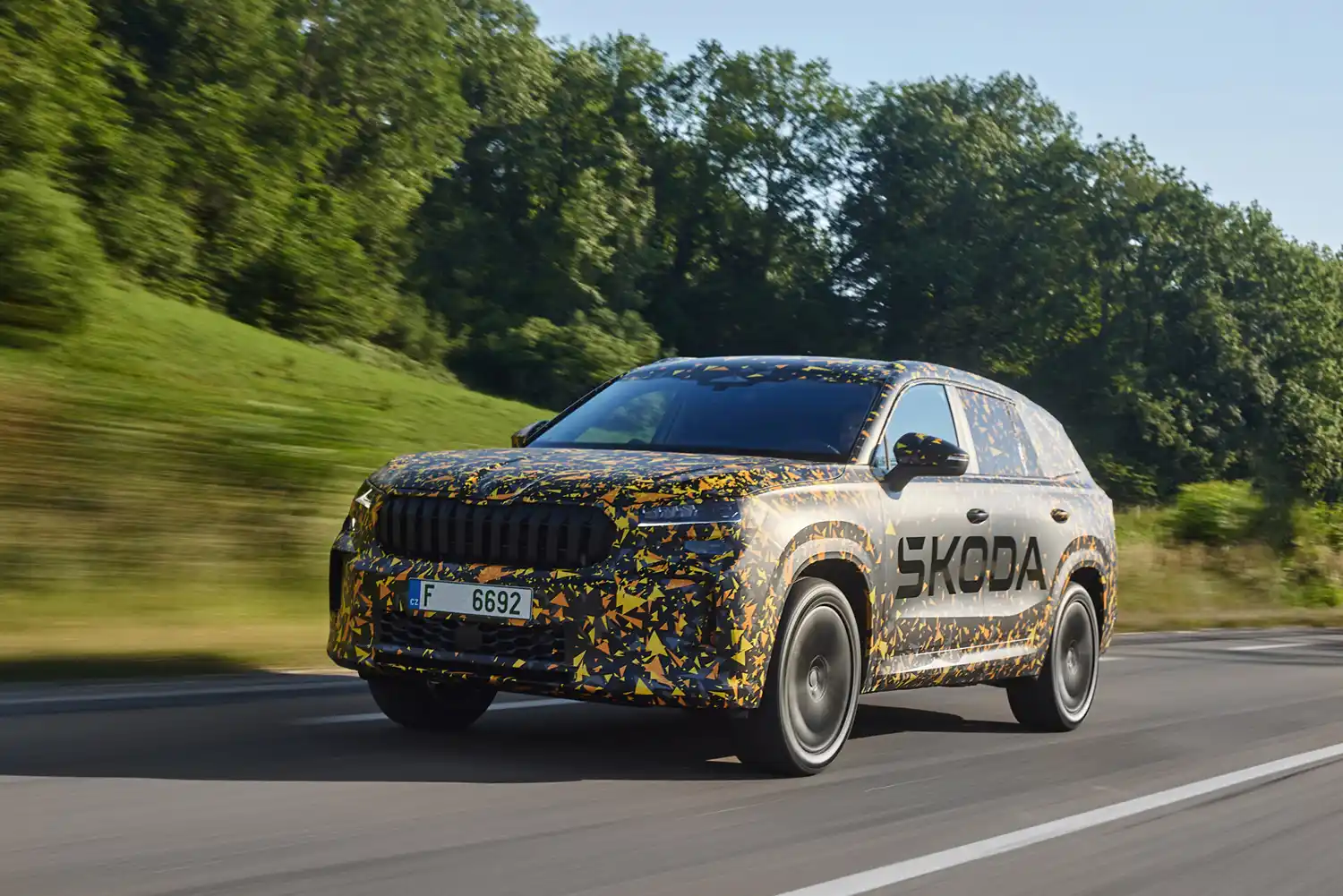
Remote parking from outside the vehicle
The new Remote Park Assist will be available for the second-generation Kodiaq in 2024. It allows the SUV to be manoeuvred into tight parking spaces from outside the vehicle using a smartphone app. The vehicle and smartphone communicate via Bluetooth over a distance of up to five metres. The Kodiaq can be moved forwards and backwards in a straight line using the smartphone as a remote control. During the parking manoeuvre, the system can detect approaching objects and pedestrians and prevent collisions automatically.
– Škoda launched the Kodiaq in 2016 to spearhead its
SUV campaign. It turned into a global success story. By the end of May 2023, the Czech brand had delivered almost 792,000 Kodiaq SUVs to customers. In addition, the model laid the foundations for an SUV family, which in Europe now also includes the Kamiq and Karoq as well as the all-electric Enyaq. In addition, the coupé variants Kodiaq GT and Kamiq GT are available exclusively in China, and the new Kushaq has taken off on the Indian market. The forerunners of today’s Škoda SUVs were the 1966 Trekka off-roader in New Zealand and the Yeti, which sold a total of 684,285 units from 2009 onwards.

The New Zealand ancestor and the “snowman”
Today’s Škoda SUVs had an early forerunner. Back in 1966, a local partner in New Zealand produced the Trekka off-roader in collaboration with Škoda engineers. It was based on the original Octavia Combi. Almost 3,000 units were built in total. The brand’s first SUV in the modern era was the 2009 Yeti, named after the legendary “snowman”. It was updated in 2013. A total of 684,285 Yeti SUVs were delivered to customers.
The Kodiaq success story
In 2016, Škoda presented the Kodiaq as the first model of its globally successful SUV campaign. In 2018, the Kodiaq RS joined the brand’s sporty RS family as the first SUV model. In Europe, the biggest markets for the seven-seater SUV are Germany, the UK and the Czech Republic. In 2021, the Kodiaq range received a makeover, and in 2022 the Kodiaq was the second most popular Škoda SUV.
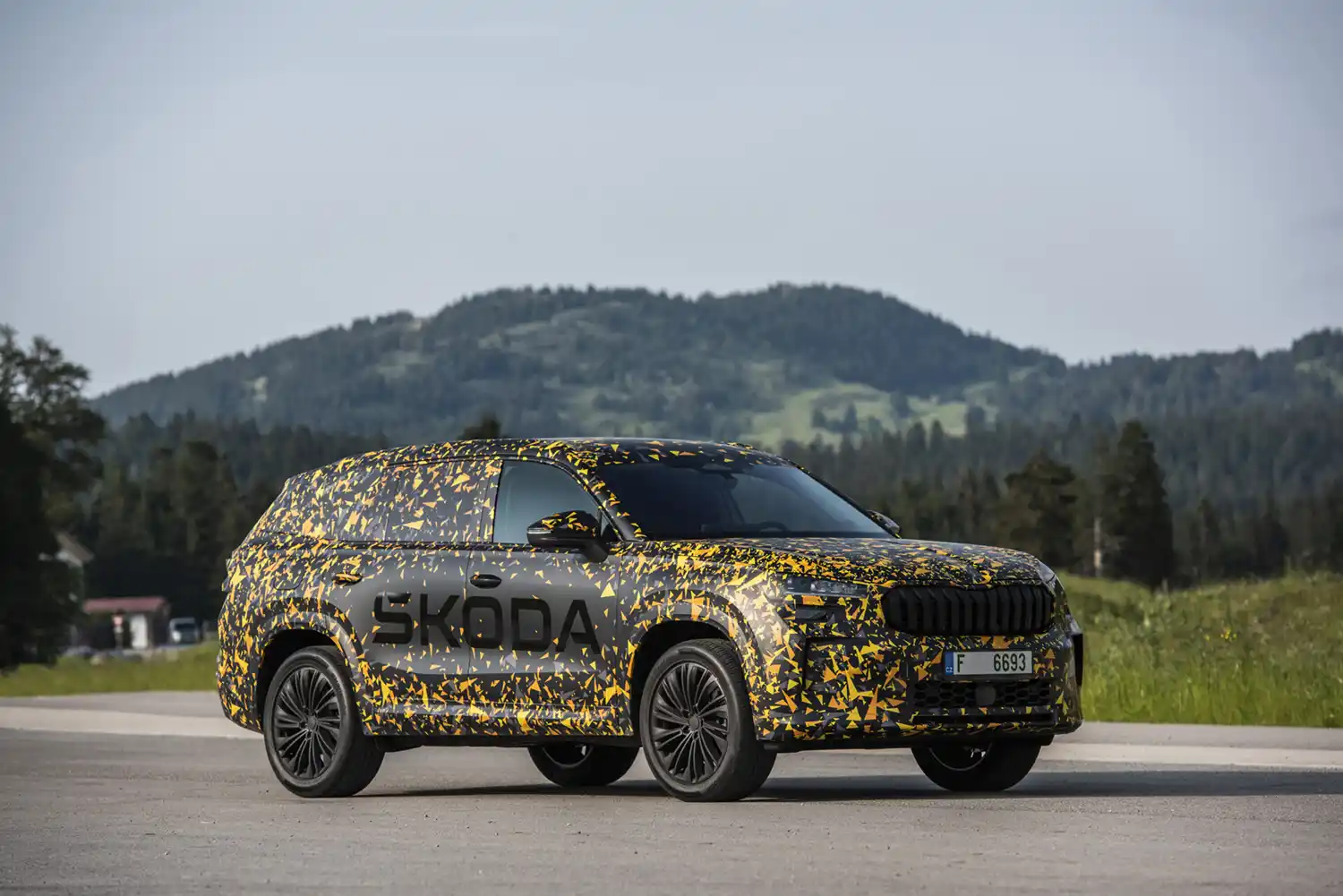
A growing SUV family
In 2017, the Kodiaq was followed by the more compact SUV model Karoq. It is available in a total of 60 countries. In 2020, the Karoq was the brand’s best-selling SUV and the second most popular Škoda model overall. It was refreshed in 2021, just like the Kodiaq. More than 618,000 Karoq SUVs had been delivered to customers by the end of 2022. In 2018, the compact Kamiq and the Kodiaq GT coupé variant were launched on the Chinese market. A similar Kamiq GT variant followed in 2019. In the same year, Škoda also presented
a Kamiq model specifically engineered for the European markets, based on the compact Scala. This marked the brand’s entry into the growing city SUV segment. The Kamiq’s most important markets are the Czech Republic, the UK and Germany. In 2021 and 2022, the Kamiq became Škoda’s best-selling SUV. In 2020, Škoda presented the Enyaq iV, its first purely battery-electric model based on the Volkswagen Group’s Modular Electrification Toolkit (MEB). With the addition of the Enyaq Coupé, Enyaq Coupé RS and Enyaq RS in 2022, there is now an entire Enyaq family. In India, the Kushaq SUV debuted in 2021. It was the first production model created as part of the India 2.0 project, which sees Škoda developing and producing vehicles in India that are designed for the local environment. The Kushaq is built on the MQB-A0-IN platform, which Škoda specifically adapted for the Indian market.




